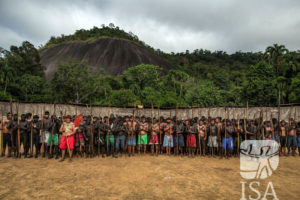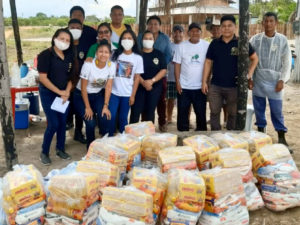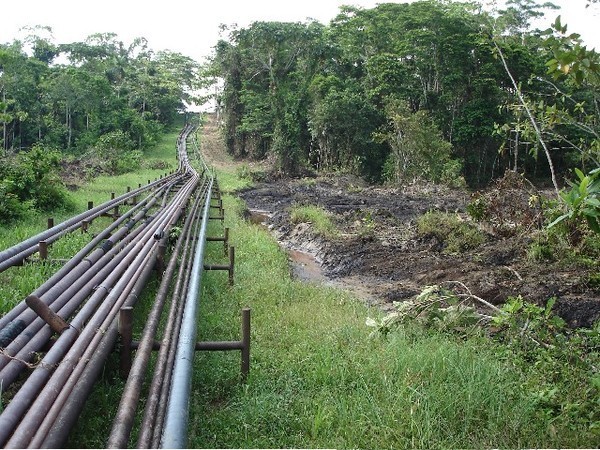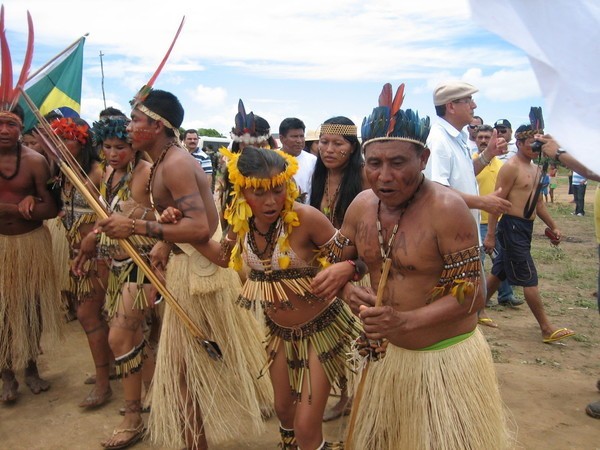Simpson Thacher Negotiates $30M Peruvian Remediation Plan
Simpson Thatcher & Bartlett LLP announced that they secured a $30 million commitment from the Peruvian government to improve land titling, environmental remediation, and basic services for indigenous communities in the Peruvian Amazonian Basin. While it is just the first step, Todd Crider—Partner at Simpson Thatcher and Vice-chair of Rainforest Fuondation US’s Board of Directors—explains, “Everyone agrees with what those rights are, and now it’s about translating those rights into something that changes peoples’ lives for the better.”
–Gavin Broady
Law360, New York
(April 10, 2015, 7:42 PM ET)
When the renewal of a massive oil concession deep in the Peruvian Amazon offered the indigenous peoples living there a chance to air their grievances over decades of environmental damage, they turned to a Simpson Thacher & Bartlett LLP pro bono team to negotiate an unprecedented road map for remediation.
Working closely with local firm Ferrero Abogados, leaders from four indigenous peoples federations and their advisors, a Simpson Thacher team lead by partner S. Todd Crider helped secure a commitment of more than $30 million from the Peruvian government. The deal, which will help address the consequences of 40 years of oil extraction in the Loreto region of northeastern Peru, was hammered out in negotiations that Crider says emphasized mutual benefit and collaboration over confrontation.
“What we sought to do was introduce into the existing mix of human rights advisers and environmental activists, a team of lawyers who were used to engaging with governments and with companies and trying to negotiate commercially viable options that are more of a win-win outcome,” Crider says. “While rights-based, we try to shift from denouncement of human rights and environmental violations, to a commercial-based and trust-building dialogue about how to achieve meaningful change that is workable for the government, private industry and for the peoples that are involved.”
Crider has worked with indigenous populations for more than 20 years and held various leadership positions with the Rainforest Foundation, a nongovernmental organization he says emphasizes the empowerment of indigenous people and occupies a crossroads between human rights and environmental conservation.
The situation in Peru began in the 1970s, when the government signed a 40-year concession to allow massive oil extraction on the Pastaza, Tigre, Corrientes and Maranon river basins.
“This oil concession represents 20 percent of national production, and was the first production in the Peruvian Amazon,” Crider says. “While it was productive, the environmental impact was devastating due initially to a lack of Peruvian laws and subsequently to the remote nature of the area, which limited attention from authorities or meaningful enforcement activity.”
The impending expiration of the concession triggered a mandatory consultation process prior to renewal, allowing the indigenous populations — comprising more than 100,000 residents — to share their grievances and seek potential remedy, Crider says.
Over the last 18 months, Simpson Thacher contributed to the consultation process and negotiations with the government on a $30 million commitment that includes land titling, water treatment, environmental remediation, health and education initiatives, and the extension of the electrical grid into rural areas.
The Peruvian government also agreed to pursue funds for comprehensive remediation from the companies that previously held the concession.
“What we’ve done together so far is promising and unprecedented in Peru, in having such a complicated situation addressed through dialogue with multiple ministries of government working together to ultimately reach an agreement on a road map,” Crider says. “Ultimately, success is not measured by paper, but by achieving the real gains sought by these indigenous groups.”
Crider notes that the negotiations were complicated by not only the region\’s remoteness but also the fact that the indigenous peoples represented four distinct populations with their own languages and chiefs.
While Crider says the deal is promising, it is still very much an evolving situation. Some remediation efforts, such as the installation of water treatment facilities, have already begun, but others will require legislative action from the Peruvian government.
The situation is also fraught enough that it could devolve into violence at any moment. There have been numerous oil field occupations in recent years that have prompted tense and occasionally deadly clashes with the local police, Crider says, though he says that the government has lately exercised greater restraint and forestalled further violence.
“One way to look at this is sort of as a massive logistics development project, in which you reach an agreement of what\’s going to happen but it takes time to implement because of the scale of the project,” Crider says. “The reality is that the ability of the government to project itself effectively into these remote areas is not as great as you would hope. So it’s very important to maintain pressure by paying attention to the situation and to keep the government honest in terms of what happens in these areas.”
While Simpson Thacher was able to provide the sophisticated commercial, legislative and regulatory experience necessary to getting the deal done, Crider is quick to credit the hard work of Ferrero, the panoply of NGOs that have worked on the project and the indigenous groups themselves, who spent years struggling to bring the problem to the world’s attention.
“Indigenous people have rights to lands they have traditionally occupied, and you should not be exploiting natural resources without consulting with them and protecting the environment,” Crider says. “Everyone agrees with what those rights are, and now it\’s about translating those rights into something that changes peoples\’ lives for the better.”
Pro Bono Spotlight is a recurring Law360 series profiling law firm pro bono efforts.
–Editing by Katherine Rautenberg and Edrienne Su.
via law360.com http://www.law360.com/articles/641805/simpson-thacher-negotiates-30m-peruvian-remediation-plan
Read More

Murder of Two Yanomami by Illegal Miners Heightens Fears of Renewed Cycle of Violence in the Brazilian Amazon
The murders reinforce the need for the Brazilian government to immediately expel the more than 20,000 miners illegally operating on Yanomami land.

Miners Out, COVID-19 Out: The Yanomami and Ye’Kwana People of the Brazilian Amazon Launch a Global Campaign to Expel Miners From Their Territory
Indigenous leaders demand the urgent removal of 20,000 illegal gold miners from their lands to prevent the spread of COVID-19

Voices from the Ground: COVID-19 Response in Roraima, Brazil
An interview with the Legal Advisor for the Indigenous Council of Roraima about adressing COVID-19 in his territory.
Support Our Work
Rainforest Foundation US is tackling the major challenges of our day: deforestation, the climate crisis, and human rights violations. Your donation moves us one step closer to creating a more sustainable and just future.



